By Glenn Dunks
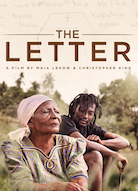
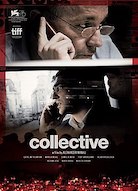
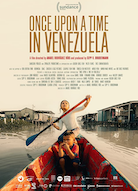
Documentaries have been popping up more and more in the line-ups for Best International Feature (née Best Foreign Language Film) since Cambodia snagged a remarkably unlikely nomination for The Missing Picture. Last year’s double-whammy nomination for Honeyland in both the international and documentary categories (from an equally unexpected country, North Macedonia) has no doubt emboldened national selectors to choose non-fiction titles, which I am certainly happy about.
Three such selections are playing DOC NYC, the New York documentary festival that opened its virtual doors yesterday. It may be too early to see what the Best International Feature category delivers us this year (as of right now the number of submissions sits at 43), but the three films here representing Kenya, Romania, and Venezuela are all strong and fine contenders. In fact, there is at least one title here that I reckon could deliver for its home country—one that has been routinely ‘snubbed’ by the category, so much so that they changed the rules. Could this be their year for redemption with one of the best movies of 2020?
ROMANIA
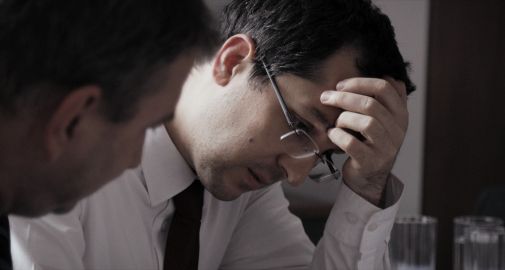
Alexander Nanau’s Collective is Romania’s submission and it’s nothing less than one of the year’s best films. It begins powerfully with the parents mourning their children, lives lost in a tragic and avoidable fire at a concert hall named Colectiv. Heartwrenching stuff, and that’s before they show the chilling video taken from inside the club as the fire broke out, killing 27 and injuring many more. This incident is the leaping off point for Nanau’s extraordinary film about the journalistic struggle to uncover the truth and the political war to fix a broken system.
It’s revealed by the Sports Gazette (Gazeta Sporturilor) newspaper that burn victims in the country’s hospitals were being kept in unsterile environments, dying while covered in maggots from infections that shouldn’t be seen in modern medical wards. It’s a sordid case of capitalistic greed, corporate delinquency and governmental neglect in a country riddled by mismanagement. A country that brought about a caretaker government because things had gotten so bad. Given a year to prove themselves before the next general election, eventually a young politician shunted into a ministerial role becomes an unlikely saviour who openly admits that “everything underneath is rotten.”
Nanau is credited here as co-editor alongside Dana Bunescu and George Cragg. Their work moving the narrative between the Gazette newsroom and the government’s back-rooms and press conferences is elegant and unshowy. As the story unfolds, the paper’s editor in chief becomes something of a national celebrity appearing on TV and in the chants of protesters who demand the hospital system’s overhaul. Collectivesuperbly charts the bureaucratic nightmare, a twisted web with mobsters, murder and whistleblowers. It’s a remarkably lithe and well-paced documentary, handsomely if simply produced with a look that recalls the courage-in-journalism affair of Spotlight. Just, you know, in Romania. The relevance of its story reaches far beyond just Nanau’s homeland, though. In a time of our own international health crisis where the lies of politicians with agendas creating spurious narratives against the public’s interest is common and goes largely unexamined by media, the story—this collective shame if you will—of Collective only gains emotional weight.
KENYA
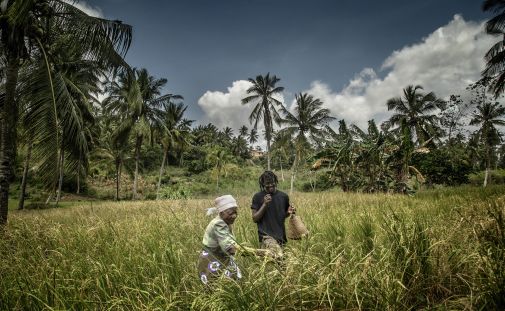
Submitting for only the sixth time Kenya chose The Letter, a tale of modern-day satanic panic in the African’s country’s rural areas. Maia Lekow and Christopher King's quietly affecting story begins with news reports of the elderly being murdered under suspicion of being witches. Karisa travels home from Nairobi to his grandmother, 94-year-old Margaret Kamango, who villagers (including her own son) suspect of witchcraft. As it has been through time, these barbaric aims are all done under the selfish guise of blame to excuse one’s own misfortunes; an easy target for susceptible believers of hoodoo priests. Or more likely just greed, as it’s revealed in one of the film’s best scenes at a desert refuge that it is almost always done to steal the Elders’ land right out from under them.
This story naturally lends itself to a film—just a few years ago, Rungano Nyoni’s I Am Not a Witch traversed similar terrain—but what struck me about The Letter is the restraint that the wife-and-husband directorial team of Lekow and King offer this dignified Elder. Beyond the sensationalism of its story, their debut film is essentially an intergenerational story of connection as grandmother and grandson —two people who grew up in wildly different worlds if still the same country— come together to understand this horror that now plagues their existence. Simply filmed but with vivid textural flourishes (a trail of ants here, a splash of fresh coconut milk there) and with some beautifully sung traditional music on its soundtrack, The Letter opens the eyes and gives this regal woman a tribute in spite of the ugliness that surrounds her.
VENEZUELA
Lastly is Once Upon a Time in Venezuela, a film that takes a while to earn its title, but which finds something resembling an old fashioned power struggle in a small community. Set on the banks of Venezuela’s Lake Maracaibo in the fishing village of Congo Mirador, Anabel Rodríguez Ríos’ film finds its setting on the brink of collapse. Besieged by corruption and pollution, its citizens’ lives are plagued by neglect from the government. Their homes are sinking and the fish that often provide their livelihoods are dying due to oil production.
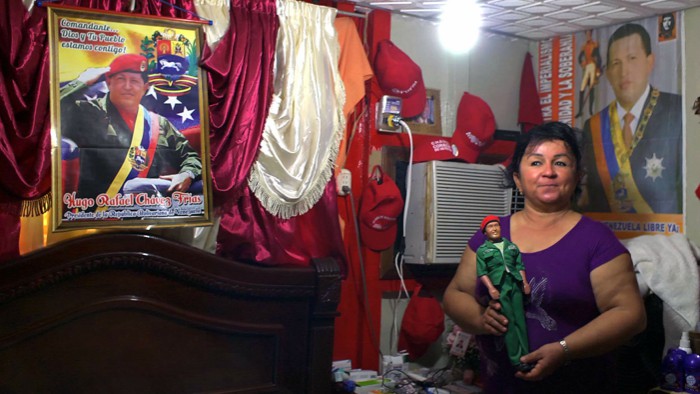
Finally we have Once Upon a Time in Venezuela, a film that takes a while to earn its title, but which eventually finds an old fashioned power struggle in a small community. Set on the banks of Venezuela’s Lake Maracaibo in the fishing village of Congo Mirador, Anabel Rodríguez Ríos’ film finds its setting on the brink of collapse. Besieged by corruption and pollution, its citizens’ lives are plagued by neglect from the government. Their homes are sinking and the fish that often provide their livelihoods are dying due to oil production.
Despite the epic tone of its title, this is rather intimate filmmaking in its early passages, although it soon elevates as the country’s national election take center stage. Ríos hangs much of the narrative on the shoulders of Mrs Tamara, a woman who holds signficant political sway in the village due to her comparative wealth. She is literally shown counting her money in multiple scenes while wheeling and dealing from her hammock. Old videos of President Chavez are often playing in the background and she gleefully shows her Chavez doll to whoever will listen. She sits in firm opposition to a local teacher, Natalie, who receives the full brunt of criticism from townsfolk for the poor education of their children while stumping for the opposition at the election.
In some ways it reminded me most notable of Alma Har’el’s Bombay Beach about an impoverished community on the shores of the Salton Sea, deserted from what was once a thriving and beautiful place. The very specific details of Congo Mirador’s existence are teased out through wonderfully shot sequences of daily life, John Márquez’s camera often sitting atop motorboats and shakily in the wood-board houses that uneasily float atop the lake. The film makes no real effort to illuminate more broadly on the troubles facing Venezuela, which can make some parts of it quite a struggle, although even the most unaware of viewers will understand the political dynamics that make up the majority of its second half. Filmed over several years, Ríos captures the beauty and the pain found in these people’s reality as the struggle with the dichotomy of living in a place that should be paradise, but is now third world. As we watch residents of Congo literally drift away, Once Upon a Time in Venezuela captures the uneasiness of its subjects’ reality as they drown from neglect.
Watch Once Upon a Time in Venezuela at DOC NYC.
Release: All three currently playing DOC NYC. Collective will be the easiest to see as it's also in theatres and on demand next week (November 20th). The Letter will next play the African Diaspora International Film Festival.
Oscar chances: Collective is, I think, I a rock-solid contender for Best Documentary Feature and Best International Feature. I suspect Kenya and Venezuela will have to sit this one out, though, especially with Lesotho’s This is Not a Burial, It’s a Resurrection likely soaking up a lot of the African attention in the Best International Feature category.